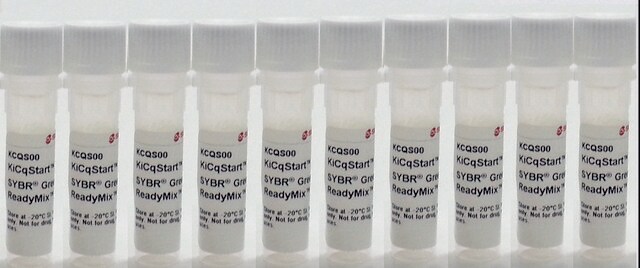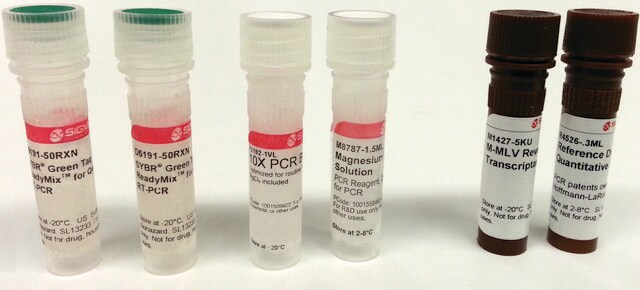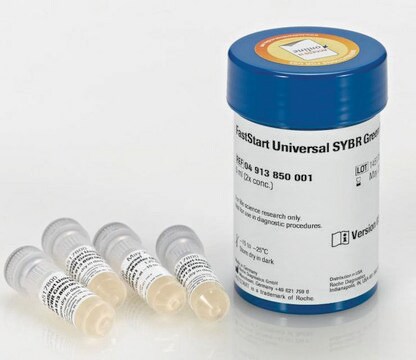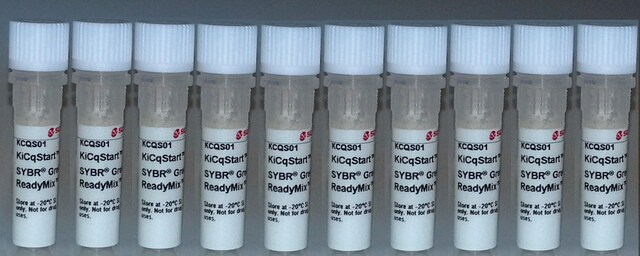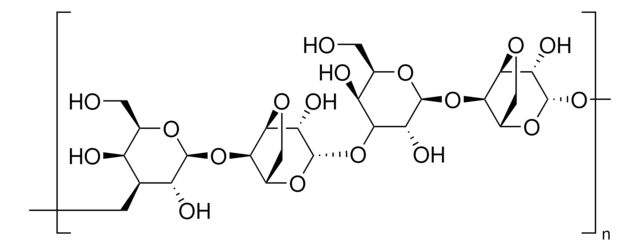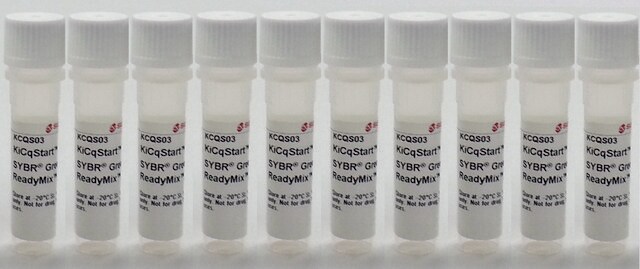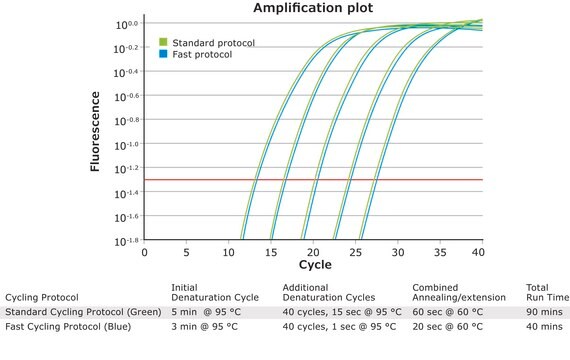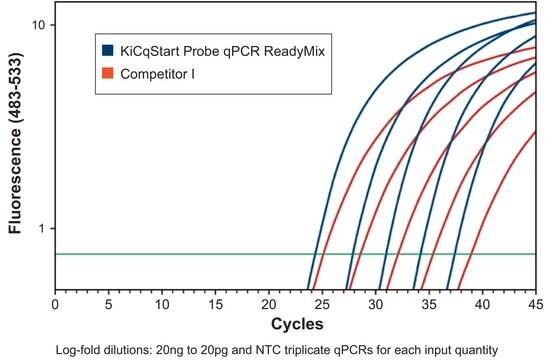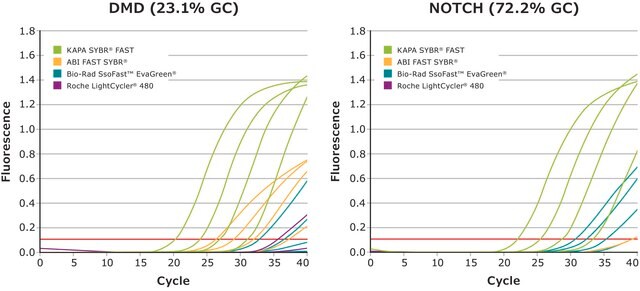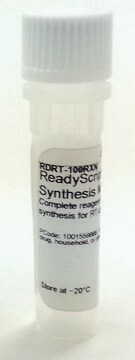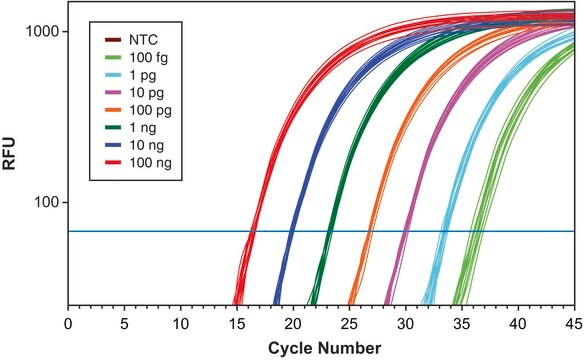KCQS02
KiCqStart® SYBR® Green qPCR ReadyMix™
with ROX™ for ABI instruments
Sinonimo/i:
qPCR master mix, sybr green qPCR
About This Item
Prodotti consigliati
Stato
liquid
impiego
sufficient for 1250 reactions
sufficient for 250 reactions
sufficient for 5000 reactions
Caratteristiche
dNTPs included
hotstart
Condizioni di stoccaggio
protect from light
tecniche
qPCR: suitable
Colore
colorless
input
purified DNA
Compatibilità
for use with ABI 5700
for use with ABI 7000
for use with ABI 7300
for use with ABI 7700
for use with ABI 7900 HT Fast
for use with ABI 7900 HT
for use with ABI 7900
for use with ABI StepOne
for use with ABI StepOnePlus
Metodo di rivelazione
SYBR® Green
Condizioni di spedizione
dry ice
Temperatura di conservazione
−20°C
Cerchi prodotti simili? Visita Guida al confronto tra prodotti
Descrizione generale
Highly specific amplification is crucial to successful qPCR with SYBR Green I dye technology because this dye binds to and detects any dsDNA generated during amplification. Hot-Start Taq DNA polymerase is antibody mediated to be inactive prior to the initial PCR denaturation step.
Applicazioni
- in the amplification and quantification of cDNA reverse transcribed from RNA extracted from mice brain samples in a 2-step RT-qPCR assay
- to analyze DNA purified by ChIP technique
- to perform gene expression analysis
- in amplification of RNA isolated from hearts of adult TL wild-type fish by quantitative real-time polymerase chain reaction (PCR)
- Gene expression
- DNA quantification
- CHiP
Caratteristiche e vantaggi
- Assay results in as little as 33 minutes
- Highly efficient and sensitive real-time PCR results
- Little/no optimization required
Componenti
packaging:
250 reactions* = 2 X 1.25 mL tubes
1250 reactions* = 10 X 1.25 mL tubes
5000 reactions* = 1 X 50 mL tube
*number of reactions based on a 20uL volume
Altre note
KiCqStart SYBR Green qPCR ReadyMix is stable for 1 year when stored in a constant temperature freezer at -20°C, protected from light. For convenience, it may be stored unfrozen at +2 to +8°C for up to 6 months. After thawing, mix thoroughly before using. Repeated freezing and thawing of the product is not recommended. However, the product demonstrated no loss of performance after 20 freeze-thaw cycles or 2 months at +20°C.
Note legali
Prodotti correlati
Raccomandato
Codice della classe di stoccaggio
12 - Non Combustible Liquids
Classe di pericolosità dell'acqua (WGK)
WGK 3
Punto d’infiammabilità (°F)
Not applicable
Punto d’infiammabilità (°C)
Not applicable
Scegli una delle versioni più recenti:
Possiedi già questo prodotto?
I documenti relativi ai prodotti acquistati recentemente sono disponibili nell’Archivio dei documenti.
I clienti hanno visto anche
Articoli
After a traditional PCR has been completed, the PCR/qPCR data analysis is conducted by resolution through an agarose gel or, more recently, through a capillary.
PCR assay guide navigates you through primer validation and other assay optimization factors to ensure high sensitivity and specificity for optimum DNA/ RNA quantification.
Real-time polymerase chain reaction allows researchers to estimate the quantity of starting material in a sample. It has a much wider dynamic range of analysis than conventional PCR
Protocolli
Quantitative PCR protocol using SYBR Green reagents. Procedure supports most qPCR instruments.
Analysis of gene expression data requires a stable reference or loading control. This reference is usually one or more reference genes.
Once an assay has been optimized, it is important to verify the reaction efficiency. This information is important when reporting and comparing assays. In this example protocol, the assay efficiency is compared over a wide and narrow dynamic range of cDNA concentrations.
Gradient PCR for assay optimization is to determine the optimum annealing temperature (Ta) of the primers by testing identical reactions containing a fixed primer concentration, across a range of annealing temperatures.
Il team dei nostri ricercatori vanta grande esperienza in tutte le aree della ricerca quali Life Science, scienza dei materiali, sintesi chimica, cromatografia, discipline analitiche, ecc..
Contatta l'Assistenza Tecnica.